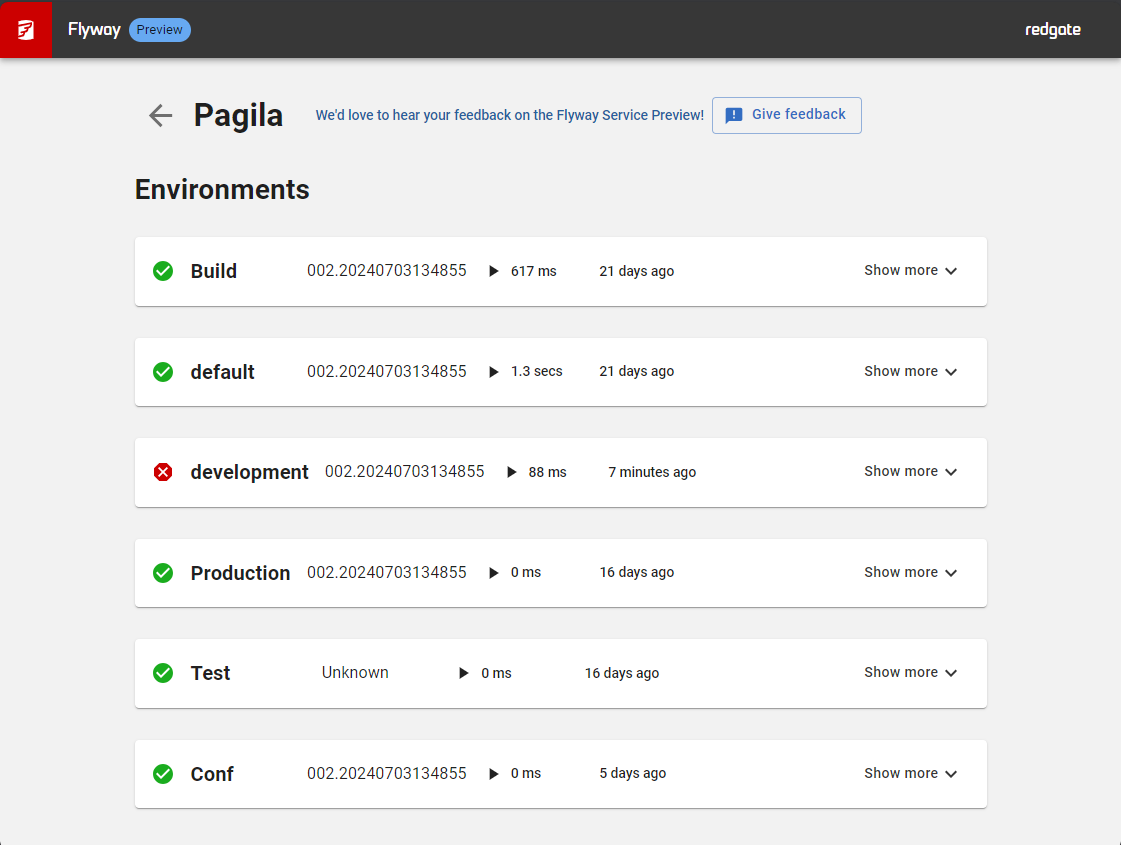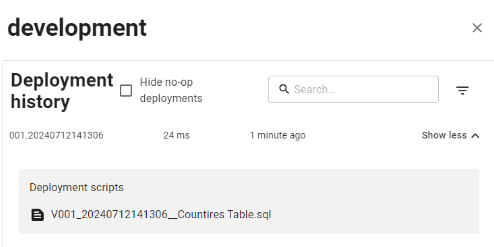🚀 Introducing Flyway Pipelines for PostgreSQL – Your New Window into Database Deployment Health and History
Published 04 October 2024
We’re thrilled to introduce Flyway Pipelines for PostgreSQL, a new free service available in preview for all Flyway users across Community, Teams, and Enterprise editions. This service provides a comprehensive view of the health and history of your PostgreSQL database changes through a single pane of glass.
In recent years, one of the biggest challenges shared by our PostgreSQL users has been gaining easy visibility into all the database changes being developed and deployed with Flyway. We believe that Flyway Pipelines will address this challenge for our PostgreSQL community by offering a range of views and data points. When you sign in to Flyway Pipelines, you can:
- Gain centralized visibility of PostgreSQL database deployments across projects, allowing end users and team leads to track what has been deployed, when, and where.
- Observe the health of your PostgreSQL database deployments, with key metrics and indicators of success.
- Support auditing requirements with a detailed history of PostgreSQL database deployments across project pipelines.
Let’s explore each of these features in more detail.
Gain centralized visibility of your PostgreSQL deployments
Flyway Pipelines will allow you to see your PostgreSQL database deployments across projects at an elevated level. This means that end users and team leads will have consistent information at their fingertips, enabling them to view who deployed what, when, and where. By consolidating the history of PostgreSQL database deployments in one place, we have eliminated the challenge teams currently face when they need to connect to multiple environments just to see the latest state of their databases. This will be especially helpful for locked-down environments.
The screenshot below shows a green bar against each of the specified project pipelines, indicating that the most recent deployment was successful. You can see the DBMS (database management systems) on which the most recent deployment was made, such as PostgreSQL. You can also see when the most recent deployment occurred.
Observe the health of your database deployments, with key metrics and indicators of success
Many of our early access program users reported to us how important it is for them to be able to check the health of their database deployments right across different projects and pipelines. They have also described how tricky this can be when environment access is locked down. For some of our users, seeing when something went wrong has been a helpful way to narrow down which of their pipelines needs some additional attention.
For example, in the screenshot below, you can see a red warning where a database deployment has failed. This means your team can see when a deployment has failed and on which pipeline, even if they were not the user running Flyway at the time of deployment.
Within the environments view of the pipeline, you can also see which of the environments has the failed deployment. The environment view of your project will also provide greater transparency and allow you to see in a single view which version of the database has been deployed to each environment.
For each environment you can view the details of the latest deployment, including how long the deployment took to complete, when it happened and the version number which is date- and time-stamped to make it unique.
By clicking on Show more, you can see a detailed deployment history for each environment. In the screenshot below, you can see that the detailed deployment history includes information such as how long the deployment took to complete, when it happened, and the script(s) that were deployed.
Support auditing requirements with a history of database deployments across project pipelines
Flyway Pipelines captures database change history to support auditing requirements. That history is stored in a secure, centrally hosted location, which is accessible anytime, anywhere and on any device. This information can securely be accessed by anyone in your organization by logging into Flyway Pipelines once a pipeline has been shared with you (currently in development), enabling you can share deployment information while not having to share your environmental information.
Flyway Support for PostgreSQL
Flyway currently supports PostgreSQL from v9 to 17, EnterpriseDB Advanced Server, EnterpriseDB Extended Server, Amazon RDS for PostgreSQL, Google Cloud for PostgreSQL, Azure PostgreSQL - Flexible Server, Azure PostgreSQL - Single Server, Aurora PostgreSQL, YugabyteDB, CockroachDB and TimescaleDB.
What’s coming next?
We really appreciate all your feedback on Flyway Pipelines, and it has directly contributed to the roadmap. Some of the capabilities we are considering for the next release include:
- Drift Alerts
- Enabling Schema Rollback
- Pre-deployment reports
If these are capabilities which would be valuable to you, please get in touch by email adam.britt@red-gate.com and let us know which capability would make the greatest difference in your day to day experience. Please share your feedback
We are excited to share our preview release of the Flyway Pipelines with you, and we would love to hear your thoughts as you get started. Please download the latest version of Flyway then access Flyway Pipelines https://flyway.red-gate.com for more information on how to get started. We’re ready to share your feedback with us, please email me adam.britt@red-gate.com. The engineering team would love to hear about your ideas and how Flyway Pipelines can support your deployment processes.








